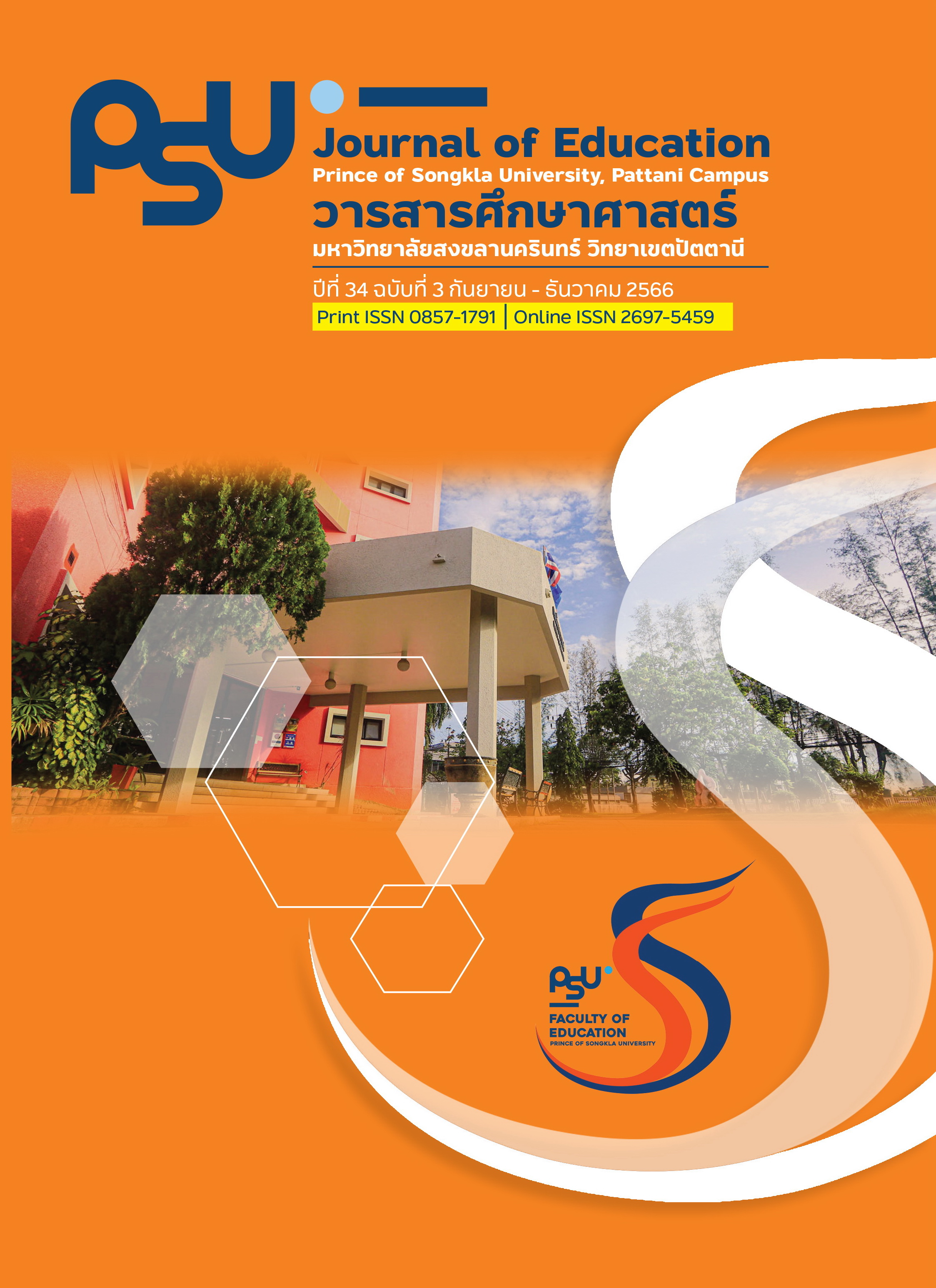ผลการสะท้อนคิดด้านสมรรถนะการจัดการเรียนรู้ของนักศึกษาฝึกประสบการณ์วิชาชีพ
Main Article Content
บทคัดย่อ
การวิจัยนี้มีวัตถุประสงค์เพื่อศึกษา 1) ผลการสะท้อนคิดด้านสมรรถนะการจัดการเรียนรู้ของนักศึกษาฝึกประสบการณ์วิชาชีพ 2) วิเคราะห์ระดับคุณภาพการสะท้อนคิดด้านสมรรถนะการจัดการเรียนรู้ของนักศึกษาฝึกประสบการณ์วิชาชีพ กลุ่มเป้าหมายของการวิจัย ได้แก่ นักศึกษาสาขาวิชาหลักสูตรและการสอน คณะศึกษาศาสตร์ มหาวิทยาลัยวงษ์ชวลิตกุล จำนวน 40 คน เครื่องมือวิจัย ได้แก่ แบบสอบถามด้านความเชื่อและความคิดเห็นเกี่ยวกับ
การปฏิบัติการสะท้อนคิดในวิชาชีพครู ซึ่งเป็นแบบมาตราส่วนประมาณค่า 5 ระดับ ที่มีค่าความเชื่อมั่นเท่ากับ .92 และแบบบันทึกการสะท้อนคิดหลังสอนที่วิเคราะห์ข้อมูลโดยการวิเคราะห์เนื้อหา สถิติสำหรับการวิเคราะห์ข้อมูล
ได้แก่ ค่าร้อยละ ค่าเฉลี่ย ค่าความเบี่ยงเบนมาตรฐาน
ผลการวิจัยพบว่า 1) นักศึกษาฝึกประสบการณ์วิชาชีพเชื่อว่า การสะท้อนคิด (1) ช่วยยกระดับการเรียนการสอนของตนเอง (87.15%) (2) ปรับปรุงการเรียนรู้ของนักเรียน (80.00%) (3) กระตุ้นให้ค้นหาวิธีการแก้ปัญหาที่เกิดขึ้นในห้องเรียน (72.50%) (4) กระตุ้นให้เขียนบันทึกการสะท้อนคิดหลังการสอน (65.00%) (5) ปรับปรุงคุณภาพการเรียนการสอน (57.50%) ส่วนความคิดเห็นของนักศึกษาฝึกประสบการณ์วิชาชีพ โดยรวมอยู่ในระดับมาก ได้แก่ (1) ประโยชน์การฝึกสะท้อนคิด (2) ความรู้สึกที่มีต่อการฝึกสะท้อนคิด (3) การปรับปรุงการสอนและการเรียนรู้ (4) ความชอบปฏิบัติกิจกรรมการสะท้อนคิด (5) และระดับปานกลาง คือ การใช้เวลาปฏิบัติกิจกรรมการสะท้อนคิด 2) ผลเกี่ยวกับระดับคุณภาพของการสะท้อนคิดด้านสมรรถนะการจัดการเรียนรู้ พบว่า ส่วนใหญ่ อยู่ระดับ 2 (ระดับความเข้าใจ) 47.50% รองลงมา ระดับ 1 (ระดับความเคยชิน) 37.50% ระดับ 3 (ระดับการสะท้อนคิด) 12.50% และ ระดับ 4 (การสะท้อนคิดอย่างมีวิจารณญาณ) 2.50%
Article Details

อนุญาตภายใต้เงื่อนไข Creative Commons Attribution-NonCommercial 4.0 International License.
เอกสารอ้างอิง
Brookfield, Stephen D. (2017). Becoming a Critically Reflective Teacher (Second Edition).
Boreen, Jean, et al. (2000). Mentoring Beginning Teachers: Guiding, Reflecting, Coaching. York, Maine San Francisco, CA: Jossey-Bass
Dewey, J. (1933). How We Think: A Restatement of the Relation of Reflective Thinking to the Educative Process (Rev. edn.). Boston, MA: D. C. Heath and Company.
Gibbs, G. (1988). Learning by Doing: A Guide to Teaching and Learning Methods. Further Education Unit. Oxford Polytechnic: Oxford.
Johns, C. (2000). Becoming a Reflective Practitioner: A Reflective and Holistic Approach to Clinical Nursing, Practice Development and Clinical Supervision, Blackwell Science. Oxford.
Kaewprom, C. (2013). Developmenton Reflective Skills of Nurse Students writing a journal on Teaching and Health Counseling Courses. Journal of Phrapokklao Nursing College, Chanthaburi, 24(2), 12-20. [in Thai]
Kember, D., McKay, J., Sinclair, K. & Wong, F. K. Y. (2008). A four-category scheme for coding and assessing the level of reflection in written work. Assessment & Evaluation in Higher Education, 33(4), 369-379.
Kolb, D. A (1984). Experiential Learning as the Science of Learning and Development. Prentice Hall, New Jersey
Mezirow, J. (1991). Transformative dimensions of adult of Learning. San Francisco, CA: Jossey-Bass.
Moon, J. (2004). A Handbook of Reflective and Experiential Learning Theory and Pr actice London, Routledge.
Moon, J.. (2006) Learning Journals: A Handbook for Reflective Practice and Professional Development. (2nd eds), London: Routledge.
Nopakhun, C, (2019). Reflective Thinking through Sketchbook Journals of Teacher Students of Early Childhood Education of Suan Dusit University. Suan Dusit Graduate School Academic Journal, 14(3), 307-322. [in Thai]
Nithitantiwat, P. (2014). Guide for Teaching and Learning management by using Reflection. (Reflection). Ratchaburi: Boromarajonani College of Nursing, Ratchaburi. [in Thai]
Pedro, J. (2006). Taking reflection into the real world of teaching. Kappa Delta Pi, 42, 129-132
Schön, D.A. (1983). The reflective practitioner. New York: Basic Books.
Schön, D.A.. (1987). Educating the Reflective Practitioner. San Francisco: Jossey-Bass.
Van Manen, M. (1997). Researching the Lived Experience: Human Science for an Action Sensitive Pedagogy. (2nd ed). New York: Routledge.
Williams, M., R. & Wessel, J. (2004). Reflective Journal Writing to Obtain Student Feedback about their Learning During the Study of Chronic Musculoskeletal Conditions. Journal of Allied Health. 33, 17-23.


